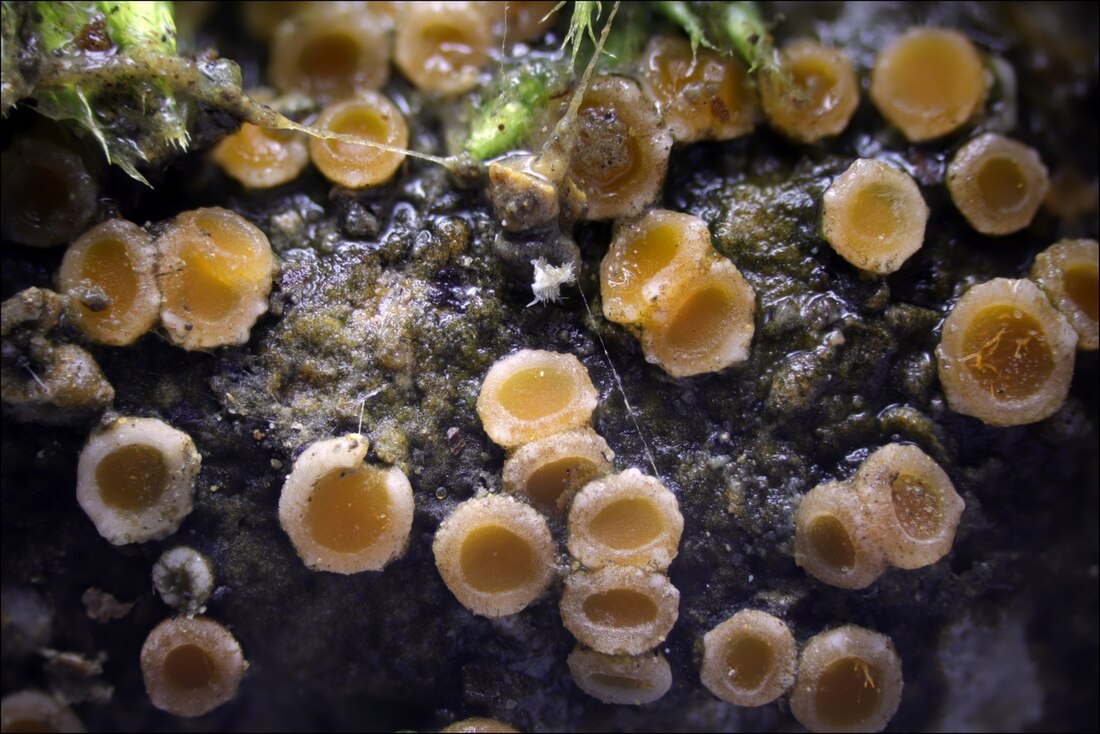Top Qs
Timeline
Chat
Perspective
Gyalectales
Order of lichen-forming fungi From Wikipedia, the free encyclopedia
Remove ads
Gyalectales is an order of lichen-forming fungi in the class Lecanoromycetes. It contains 5 families, 18 genera and about 550 species.
Remove ads
Taxonomy
Summarize
Perspective
The Gyalectales were introduced in a 1974 publication by Aino Henssen and Martin Jahns,[1] but not formally published until 1986 by David Hawksworth and Ove Eriksson.[2]
Phylogeny
An early (2002) phylogenetics study showed that the order Ostropales, as was then circumscribed, was paraphyletic, and proposed that the Ostropales sensu lato included the Gyalectales and Trapeliaceae.[3] Although they had traditionally been considered to be only distantly related, molecular studies suggested a much closer phylogenetic relationship.[4][5] As a result, of the molecular data, Kauff and Lutzoni subsumed the Gyalectales into the Ostropales, as the latter name was published earlier (1932 vs. 1986).[3]
In 2018, Kraichak and colleagues used a recently developed "temporal phylogenetic" approach to identify temporal bands for specific taxonomic ranks. Based on this approach, clades that share a common ancestor between 176 and 194 Mya and a time window of 111–135 Mya correspond to order-level and family-level, respectively. The Gyalectales clade, consisting of the families Trichotheliaceae, Coenogoniaceae, Sagiolechiaceae, Gyalectaceae and Phlyctidaceae, has a crown node that falls within the temporal band for orders. For this reason the name Gyalectales was resurrected to represent the monophyletic clade.[6] Gyalectales itself is placed in Ostropomycetidae, one of two major subclasses in the Lecanoromycetes.
This proposed classification has been accepted in a later review of the temporal banding method for fungus systematics,[7] as well a 2022 update on fungal classification.[8]
Remove ads
Families and genera
Summarize
Perspective
This is a list of the families and genera contained within the Gyalectales, based on a 2022 review and summary of fungal classification.[8] Following the taxon name is the taxonomic authority, year of publication, and (for genera) the number of species:

- Coenogoniaceae Stizenb. (1862)
- Coenogonium Ehrenb. (1820)[9] – ca. 91 spp.
- Gyalectaceae Stizenb. (1862)
- Cryptolechia A.Massal. (1853) – 11 spp.
- Francisrosea Ertz & Sanderson (2021)[10] – 1 sp.
- Gyalecta Ach. (1808)[11] – 50 spp.
- Neopetractis Ertz (2021)[10] – 2 spp.
- Ramonia Stizenb. (1862) – 24 spp.
- Semigyalecta Vain. (1921)[12] – 1 sp.
- Phlyctidaceae Poelt ex J.C.David & D.Hawksw. (1991)[13]
- Phlyctis (Wallr.) Flot. (1850)[14] – 20 spp.
- Psathyrophlyctis Brusse (1987)[15] – 1 sp.
- Sagiolechiaceae Baloch, Lücking, Lumbsch & Wedin (2010)[16]
- Rhexophiale Th.Fr. (1860) – 1 sp.
- Sagiolechia A.Massal. (1854)[17] – 3 spp.
- Porinaceae Rchb. (1828)[18]
- Clathroporina Müll.Arg (1882) – ca. 25 spp.
- Flabelloporina Sobreira, M.Cáceres & Lücking (2018)[19] – 1 sp.
- Myeloconis P.M.McCarthy & Elix (1996)[20] – 4 spp.
- Porina Ach. (1809) – ca. 145 spp.
- Pseudosagedia (Müll.Arg.) Choisy (1949)[21] – 80 spp.
- Saxiloba Lücking, Moncada & Viñas (2020)[22] – 2 spp.
- Segestria Fr. (1825) – 70 spp.
- Trichothelium Müll.Arg. (1885)[23] – 40 spp.
Remove ads
References
Wikiwand - on
Seamless Wikipedia browsing. On steroids.
Remove ads

